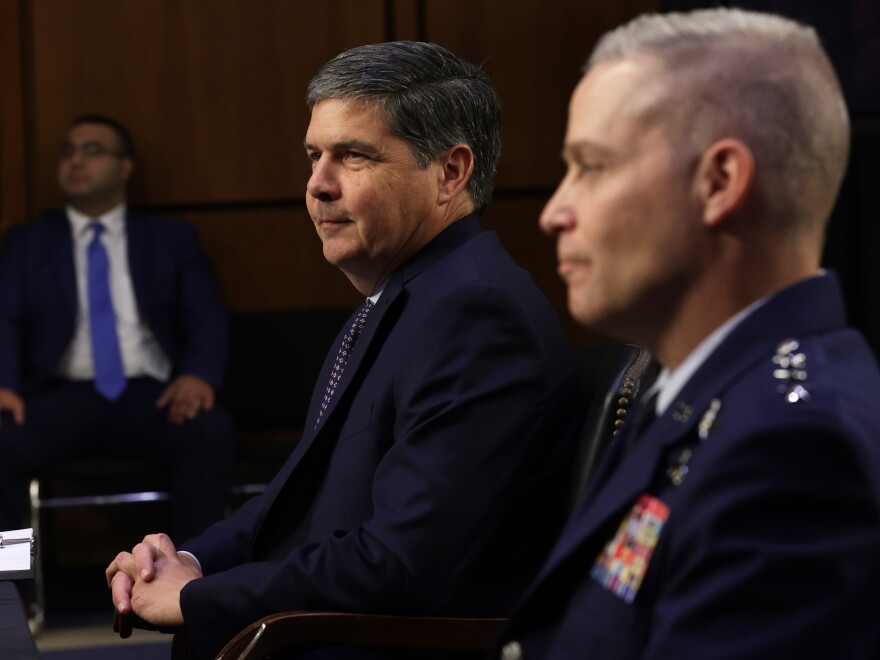As the head of American counterintelligence, Mike Casey sees on a daily basis the scope of foreign spying operations, cyberattacks and economic espionage against the United States.
"The scale is impressive and terrifying," said Casey, who stepped into his current job last year after working for more than two decades in Congress. He finished up his time on the Hill as the staff director for the Senate Intelligence Committee, so he already had deep understanding of the array of threats facing the U.S.
What's changed now, though, is it's his responsibility to keep those secrets safe.
"Fortunately for me, and unfortunately for everybody else, counterintelligence, it turns out, is a growth business," he told NPR in an interview. "More players are getting into it with more tools, going after more targets."
The list of concerns is a long one. The usual suspects — China, Russia, Iran and North Korea — lead the way, he says, but there are other actors, including private sector entities and cybercriminals who are also getting involved.
"It's not just the Russians stealing secrets from the State Department anymore," Casey said. "It's everybody trying to steal all sorts of intellectual property, going after critical infrastructure. Just the list goes on and on."
For all the changes, one foreign adversary still stands out, he says, for the ambition and scale of its espionage efforts against the U.S.: the People's Republic of China.
The kinds of U.S. targets China goes after
Casey says Beijing has studied American history and has concluded that the U.S. achieved greatness, in part, by helping craft the world system that emerged from the ashes of World War II and the rules that govern it.
"And they have a view of national greatness that essentially says, 'If we can supplant the United States in key technology, both military and non-military, and help establish sort of the international regulatory scheme for all that, then we will become the preeminent player in the international area,' " Casey says.
That interpretation influences how China's intelligence officers operate and the kind of targets they go after in the U.S.
"It's not so much a guy in a black hat breaking into the plant and stealing the tank armor out the back," Casey says. "It's much more of a hacking operation or hiring a scientist."
He points to a recent Justice Department case charging a former Google engineer with stealing the building blocks of the company's AI technology. The defendant, a Chinese national, was allegedly secretly working for two China-based technology companies at the same time that he was pilfering files from Google.
The case is just the latest in what American officials say is a relentless campaign by China to try to steal American trade secrets, cutting-edge research and technology as well as intellectual property.
U.S. officials and lawmakers have spent a lot of time in recent years meeting with American businesses and universities to try to keep them informed about what the government says are China's efforts against them.
Casey says that conversation has changed from five years ago.
"The question then you got was, 'Really, how bad is it? I'm not sure I believe you.' The question now is, 'What do I do?' And that's a fundamental change," he said. "I think the threat has been absorbed, and you're much more in the practicalities of how do I deal with this as a private sector entity."
Russia is another top concern
The Kremlin presents a different sort of threat from China. Moscow, for one, doesn't target U.S. economic secrets like Beijing does.
"Certainly not to the same extent," Casey says. "They're still much more in their classic model of government secrets, military secrets."
In 2018, the Trump administration expelled 60 Russian diplomats that the U.S. had identified as intelligence officers. The move was a response to a nerve agent attack in the United Kingdom against a retired Russian intelligence officer.
Asked whether Russia has managed to rebuild its intelligence operations in the U.S. since then, Casey replied with "a qualified somewhat, yes."
"I think what we believe is that they have managed to rebuild some of that stable," he said.
While China and Russia are two of the top concerns for Casey, a recent Justice Department case demonstrated that smaller nations can't be overlooked, either. A former U.S. ambassador, Victor Manuel Rocha, was arrested and charged late last year with spying for Cuba.
Rocha has since pleaded guilty. The fact that a one-time ambassador was spying was bad enough. But Rocha did so undetected for 40 years.
How big of a counterintelligence failure was that?
"Obviously not a small one," Casey says. "But we don't actually know how big it was yet until we go through and do the damage assessment. The IC [intelligence community] will take a hard look at whatever was compromised and whatever damage it did, but certainly, somewhere, we dropped the ball."
Rocha's spying pre-dates Casey's time in the job. Still, it's a reminder of a point Casey makes about the spying business: Never assume that you know everything and that you've got it all in hand.
"We're counterintelligence," Casey says. "Paranoia is kind of what we do."
Copyright 2024 NPR. To see more, visit https://www.npr.org.




